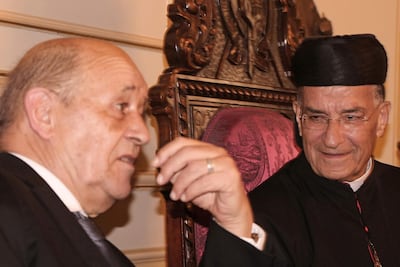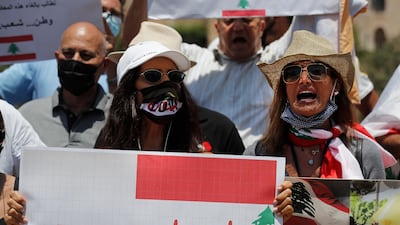Earlier this month Lebanon’s Maronite Christian patriarch Bishara Al Rai made the first of a series of sermons in which he issued an appeal for Lebanon to be a neutral country and for this neutrality to be recognised internationally. The appeal has opened up fault lines within the country’s sectarian order, placing Hezbollah and many officials in the Shia community in a quandary.
At the heart of the patriarch’s thinking is the fact that today Lebanon is widely perceived in the region and outside it as having fallen under the control of Iran and Hezbollah. Because of this, no Arab country, including historically, supporters from the Gulf, has intervened to assist Lebanon as it faces a major financial crisis and the prospective collapse of its economy.
Yet to reduce Patriarch Rai’s thinking to a matter of money would be a mistake. It goes beyond that to include a conviction about Lebanon’s nature. “Today, Lebanon has become isolated from the whole world,” he stated on July 14. “This is not our identity. Our identity is positive and constructive neutrality, not a warrior Lebanon,” he added, in a clear reference to Hezbollah’s militancy.
The patriarch was harking back to a founding principle of post-Independence Lebanon, one integrated into the defining National Pact agreed in August 1943 between the leading Maronite and Sunni politicians in the country at the time, Bishara Al Khoury and Riad Al Solh.
Among the things they decided was that Lebanon would have an “Arab face” but would also be independent. By this they meant the country would remain at an equal distance from France, then still the mandatory power, and the Arab world. Christians would not seek French or Western involvement in Lebanese affairs, and Sunni Muslims would avoid unification schemes with other Arab states.

This idea of Lebanon as “tilting neither East nor West” took on a more positive role in the years following independence, when Lebanon’s wealth was built on its being a link between East and West. The country was a regional entrepot that benefited financially and politically from its economic accessibility and being on good terms with most of the broader regional and global alignments.
Therefore, in tying Lebanon’s disastrous economic situation today to the fact that it has abandoned its openness to all sides, Patriarch Rai was implicitly pointing a finger at Hezbollah, which has driven the country into the pro-Iran camp, with its myriad enmities. Following his appeal, local and foreign politicians opposed to Iran’s hold over Lebanon met with the patriarch and many backed his views.
The political and sectarian dividing lines were very clear. Hezbollah and members of the clergy supportive of the party criticised the patriarch’s appeal. Christian politicians allied with Hezbollah, such as President Michel Aoun and his son-in-law Gebran Bassil, were in a bind. While they could not openly oppose their community’s religious leader, they added caveats underlining their lack of enthusiasm for what he had said, against the views of many other Christians.
Some will focus on whether the patriarch’s initiative has any chance of being implemented. The simple answer is no, not in a country where Hezbollah plays a leading political role and intends to keep Lebanon within the Iran-led “axis of resistance.” However, the patriarch did throw a stone into the hitherto serene pond of Hezbollah’s highhandedness in Lebanon. Nor was this new.
The first challenge to Hezbollah’s and Syria’s vision for Lebanon came during the years of the late prime minister Rafik Hariri. At the time, Hariri’s ideal echoed the post-Independence republic—that of a country that would become the region’s business centre, attract outside investment, and appeal to the Arab world and the West. Standing against this was the preference of Hezbollah and Syria for a garrison state that would focus on opposing Israel and the US.








These two visions clashed and in 2005 when Hariri was about to lead a political alliance in legislative elections that could have challenged Syria’s hold on Lebanon he was assassinated. In the aftermath of his killing, Hezbollah sought to reverse the uprising of 2005 that had forced Syria to withdraw from the country, and it began asserting its hegemony over Lebanese institutions.
This push was accompanied by the imposition of Iranian priorities. The party intervened in the Syrian conflict on behalf of the Assad regime in 2013, though it had previously agreed with its Lebanese partners to a policy of “distanciation” that would preclude such an action.
Hezbollah’s main agenda is to keep Lebanon in the Iranian orbit, whatever the price. However, what Patriarch Rai has done is to rip away the facade the party had imposed on all, making it clear that Hezbollah’s model is one that many Lebanese oppose. While the party claims to be a “national resistance,” neutrality towards regional conflicts appears to be much more enticing for many Lebanese.
Does this matter? Short of engaging in a civil war, the best that Hezbollah’s Lebanese opponents can do is reassert preferences for the country that are well anchored in a national consensus. Hezbollah can intimidate those with whom it disagrees but it cannot change minds. It is to Patriarch Rai’s credit that he has shown that the party’s sway over Lebanon is more fragile than it appears, even as his appeal offers a stinging riposte to those in Israel and the US who insist that Lebanon and Hezbollah are one and the same.
Michael Young is editor of Diwan, the blog of the Carnegie Middle East programme, in Beirut


